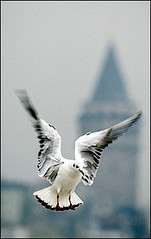First there was this gun ....
It was developed by General Electric, the "We bring good things to life" people. It's one of the modern-day Gatling guns. It shoots very big bullets. It shoots them very quickly.
Someone said, "Let's put it in an airplane."
Someone else said, "Better still, let's build an airplane around it."
So they did. And "they" were the Fairchild-Republic airplane people.
And they had done such a good job with an airplane they developed back in WWII .
...called the P-47 Thunderbolt, they decided to call it the A10 Thunderbolt.
They made it so it was very good at flying low and slow and shooting things with that fabulous gun.
But since it did fly low and slow, they made it bulletproof, or almost so. A lot of bad guys have found you can shoot an A10 with anything from a pistol to a 23mm Soviet cannon and it just keeps on flying and shooting.
When they got through, it looked like this ....
It's not sleek and sexy like an F18 or the stealthy Raptors and such, but I think it's such a great airplane because it does what it does better than any other plane in the world.
It kills tanks.
Not only tanks, as Sadam Hussein's boys found out to their horror, but armored personnel carriers, radar stations, locomotives, bunkers, fuel depots ... just about anything the bad guys thought was bulletproof turned out to be easy pickings for this beast.
See those engines. One of them alone will fly this puppy. The pilot sits in a very thick titanium alloy "bathtub."
That's typical of the designThey were smart enough to make every part the same whether mounted on the left side or right side of the plane, like landing gear, for instance.
Because the engines are mounted so high (away from ground debris) and the landing gear uses such low pressure tires, it can operate from a damaged airport, interstate highway, plowed field, or dirt road.
Everything is redundant. They have two of almost everything. Sometimes they have three of something. Like flight controls. There's triple redundancy of those, and even if there is a total failure of the double hydraulic system, there is a set of manual flying controls.
Capt. Kim Campbell sustained this damage over Baghdad and flew for another hour before returning to base. But, back to that gun ....
The 30mm is MUCH bigger.
Down at the bottom are the .50 BMG and 20x102 Vulcan the fellow was holding. At the bottom right is the bad boy we're discussing.
Let's get some perspective here: The .223 Rem (M16 rifle round) is fast. It shoots a 55 or so grain bullet at about 3300 feet/sec, give or take. It's the fastest of all those rounds shown (except one). When you move up to the .30 caliber rounds, the bullets jump up in weight to 160-200 grains. Speeds run from about 2600 to 3000 fps or so.
The ..338 Lapua is the king of the sniper rifles these days and shoots a 350 grain bullet at 2800 fps or so. They kill bad guys at over a mile with that one.
The .50 BMG is really big. Mike Beasley has one on his desk. Everyone who picks it up thinks it's some sort of fake, unless they know big ammo. It's really huge with a bullet that weighs 750 grains and goes as fast the Lapua.
I don't have data on the Vulcan, but hang on to your hat.
The bullet for the 30x173 Avenger has an aluminum jacket around a spent uranium core and weighs 6560 grains (yes, over 100 t imes as heavy as the M16 bullet, and flies through the air at 3500 fps (which is faster than the M16 as well).
The gun shoots at a rate of 4200 rounds per minute. Yes, four thousand. Pilots typically shoot either one- or two-second burst which set loose 70 to 150 rounds. The system is optimized for shooting at 4,000 feet.
OK, the best for last.
You've got a pretty good idea of how big that cartridge is, but I'll bet you're like me and you don't fully appreciate how big the GA GAU-8 Avenger really is.
Take a look ....
Down at the bottom are the .50 BMG and 20x102 Vulcan the fellow was holding. At the bottom right is the bad boy we're discussing.
Let's get some perspective here: The .223 Rem (M16 rifle round) is fast. It shoots a 55 or so grain bullet at about 3300 feet/sec, give or take. It's the fastest of all those rounds shown (except one). When you move up to the .30 caliber rounds, the bullets jump up in weight to 160-200 grains. Speeds run from about 2600 to 3000 fps or so.
The ..338 Lapua is the king of the sniper rifles these days and shoots a 350 grain bullet at 2800 fps or so. They kill bad guys at over a mile with that one.
The .50 BMG is really big. Mike Beasley has one on his desk. Everyone who picks it up thinks it's some sort of fake, unless they know big ammo. It's really huge with a bullet that weighs 750 grains and goes as fast the Lapua.
I don't have data on the Vulcan, but hang on to your hat.
The bullet for the 30x173 Avenger has an aluminum jacket around a spent uranium core and weighs 6560 grains (yes, over 100 t imes as heavy as the M16 bullet, and flies through the air at 3500 fps (which is faster than the M16 as well).
The gun shoots at a rate of 4200 rounds per minute. Yes, four thousand. Pilots typically shoot either one- or two-second burst which set loose 70 to 150 rounds. The system is optimized for shooting at 4,000 feet.
OK, the best for last.
You've got a pretty good idea of how big that cartridge is, but I'll bet you're like me and you don't fully appreciate how big the GA GAU-8 Avenger really is.
Take a look ....






















No comments:
Post a Comment